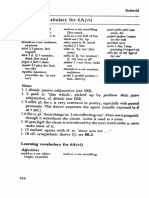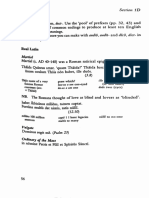Professional Documents
Culture Documents
Reading Latin 036 To 055
Reading Latin 036 To 055
Uploaded by
HeianYi0 ratings0% found this document useful (0 votes)
100 views20 pagesReading Latin (Jones, Sidwell) [page numbers in title]
Original Title
Reading Latin 036 to 055
Copyright
© © All Rights Reserved
Available Formats
PDF or read online from Scribd
Share this document
Did you find this document useful?
Is this content inappropriate?
Report this DocumentReading Latin (Jones, Sidwell) [page numbers in title]
Copyright:
© All Rights Reserved
Available Formats
Download as PDF or read online from Scribd
Download as pdf
0 ratings0% found this document useful (0 votes)
100 views20 pagesReading Latin 036 To 055
Reading Latin 036 To 055
Uploaded by
HeianYiReading Latin (Jones, Sidwell) [page numbers in title]
Copyright:
© All Rights Reserved
Available Formats
Download as PDF or read online from Scribd
Download as pdf
You are on page 1of 20
<17
mane 2 1 wait
me-us a um my, mine
mi‘O my’
miser miser-a um unhappy
moned 2.1 advise, warn
murmurd 11 mutter
neque neither, and
nimis too (much)
nas (nom., acc.) we, us
ftumquam never
occid® I'm done for!
occipiti-um 7 2n. back of
head
occliide shut!
ocul-us 72m. eye
ohé stop!
operam da! pay attention!
pauper (nom.) poor (man)
+ not
Learning vocabulary
Nouns
aqu-a ae 1f. water
domin-us 7 2m. master,
lord
Adjectives
mal-us a um bad, evil,
wicked
Verbs
511 ponder, reflect,
consider
103-5 11 ask
seru-5 1 I save, keep
Others
8 ex (+abl.) out of, from
neque neither; and...
not; nor
New forms: adjectives
miser miser-a um
miserable, unhappy,
wretched
36
peciini-a ae 1f. money
per diem by day
per noctem by night
perit I'm lost!
peruigilé 11 stay awake
praetor praetor-is 3m.
praetor
prohibé stop (her)!
quid what?
quid agis? what are you
(6.) up to?
ud where?
redeé 1 return
redit (he/shefit) returns
respondé reply!
1og6.1 1 ask (for)
salu-us a.um safe
sécum with himself/herself
for 1C
ocul-us 72m. eye
wicin-us 7 2m.
neighbour(ing)
me-us a um my, mine
(voc. mi ‘O my’)
st-5 1 stand
uerber-6 1 I flog, beat
uex-5 1 I annoy, trouble,
worry
numquam never
quid? what?
statim at once
Section 1C
sédulé carefully
serua keep!
seruS 1 1 keep, preserve
sollicits 11 worry
sta! stand (still)!
statim at once
tacé shut up!
taceé 2.1 am silent
tam so
tu-us a um your
uerberé 1 1 flog, beat
uexé 1 I annoy, trouble
uicin-us 7 2m. neighbour
ut how!
ut ualés? how are you?
(s.)
ignis ign-is 3m. fire
saluous a um safe
tueus a um your(s)
mane-6 21 remain, wait
mone-6 2 1 advise, warn
tace-6 2 | am silent
ut how!
18
19
Section 1C 19
New forms: verbs
€6 I go, come; cf. exed
I come, go out; abed
I come, go away; adeé
I go, come to,
approach; redeé I return
Grammar and exercises for 1C
Present imperative active 1st and 2nd conjugation
1st conj. 2nd conj.
2nds. ama ‘love!’ hab@_— ‘have!’
2nd pl. ami-te ‘love!’ —habé-te_ have!”
Notes
1 These forms express a command in Latin.
2 The understood subject is ‘you’ (s. or pl.).
3 The s. form is the bare stem of the verb; the pl. adds -te.
Exercises
Construct and translate the s. and pl. imperatives of these verbs: times, rogo,
taced, cdgitd, moned, ciird, possided, (optional: habed, std, explicd,
céld, amd, uided, mane).
2 Translate into English: da corénam!; porta aquam!}; in aedibus manéte!;
tacé!; thésaurum serua!; monéte filiam!
3. Translate into Latin: see! (pl.); ask Euclio! (s.); be quiet! (pl.); hide the
pot! (pl).
ed ‘I go’, ‘I come’ (irregular): present indicative active
Ist s. cd ‘I go’, ‘I come’, ‘I am going/coming’, ‘I do go/come’
2nd s. ‘you go’, ‘you come’ etc.
3rd s.
1st pl.
2nd pl.
3rd pl.
37
20
21
19 Section 1C
Imperatives
nds. 3 “go!” etc
2nd pl.
Notes
1 The stem of the verb is simply i- (as shown by the imperative s
2 There are many compound words based on ¢6, c.g. ades ‘I approach’,
go up to’ (cf. ad ‘towards’, ‘near’); see learning vocabulary for 1C.
Exercises
1 Translate into English and then turn s. into pl. and vice versa: 1; cunt; itis; €0;
it; imus; exitis; abimus; abitis; redeunt; re ite; reded; exeunt.
2 Translate into Latin: we are going away; they return; go away! (s.); you
(pl.) are approaching; she is coming out; | am going; go back! (pl.);
you (s.) go.
1st and 2nd declension adjectives: meus, tuus
me-us aum ‘my’, ‘mine’, and tu-us a umn ‘your(s)’ decline exactly like mult-
us a.um, and agree with their nouns in the same way. Observe that fu-us
means ‘your(s)’ when you are one person.
NB. The vocative of meus is mi (cf. 17A), e.g. mi filt ‘O my son’.
Ist and 2nd declension adjectives: miser miser-a miser-um
m. f n
miser-a miscr-um
miser-am —miser-um.
miser-ae — miser-i
miser-ae — miser-3.
miser-a miscr-6.
nom.
ace.
gen.
dat.
abl.
m. Sf n.
nom. miser-i miser-ae miser-a
acc, miser-ds miser-as miser-a
38
22
Section 1C 22
gen. miser-Srum —miser-irum_— miser-drum
dat. «miser-is>
abl. «miser-is>
NB. Arrows indicate that the form shown is the same for all genders.
Exercises
1 Add the appropriate forms of meus and tuus to the following nouns (see 20)
and say what case they are: igne; aedis; honéris; familia; oculérum;
dominé; aquae; Euclidnem; senex.
2 Add the appropriate form of miser to the following nouns and say what case
they are: Euclidni; Phaedra; deus; filiam; aedibus; domini; seruarum;
coquis; senum.
Personal pronouns: ego ‘I’ and til ‘you’
nom. égo ‘T ta ‘you’
acc, mé te
gen. méi tat
dat. mihi (mi) tibi
abl. mé te
Notes
1 ti is used when one person is being referred to (cf. tuus).
2 When ‘T or ‘you’ are subject ofa verb, we have seen that Latin doesnot
need to express them separately, since the verb itself indicates the
person by its personal endings -6, -s, -t etc. But Latin does use ego, tii
when the speaker wants to stress the identity of the person talking or
draw a specific contrast between one person and another. E.g.
(a) ego Eucliénem ams, ti Phaedram ‘I like Euclio, whereas you like
Phaedra’
(b) ego deum ciiro, tii senem uexas ‘I care for the god, you simply annoy
the old man’
It is a matter of emphasis, especially when a contrast is involved.
3 mei and tut are ‘objective’ genitives, ic. ‘of me’, ‘of you’ means
‘directed at me/you’, For example, amor tri means ‘love of]for you’ in
the sense ‘love directed at you’. The idea ‘belonging to me/you’ is
performed by the adjectives meus, tuus e.g. pater meus = ‘my father’, i.e.
‘the father belonging to me’.
39
23 Section 1€
Exercises
1. Translate these sentences, then change nouns and their adjectives and verb to
the s. or pl. as appropriate:
(a) manent in domini mei aedibus neque seruae neque serui.
(b) mali senis mala serua dominum meum uexat.
(c) tuus uicinus uicinum meum uidet.
(d) _ senis miseri seruus in aedibus numquam manet.
(e) seruae miserae ad Larem meum numquam adeunt neque
supplicant.
(f) dominus malus seruas statim uerberat miseras.
2 In these sentences, most adjectives are not directly next to the noun they
qualify. Read through each sentence, predicting the gender, number and case of
the noun you await (where the adjective comes first) and indicating when the
adjective is ‘solved’. Then translate.
(a) malus igitur senex ndn multum habet hondrem.
(b) mea est tuus ignis in aula.
(c) meis tamen in aedibus multi habitant patrés.
(d) malés enim senés Lar nén amat meus.
(e) meusne tuum seruat pater ignem? (-ne = ?)
3 Translate these sentences:
(a) sola peciinia régnat. (Petronius)
(b) uéritas numquam perit. (Seneca)
(c) semper auarus eget. (Horace)
(d) nén déterret sapientem mors. (Cicero)
(©) in fuga foeda mors est, in uictoria gléridsa. (Cicero)
sél-us a.um alone auar-us i 2m. miser mors mort-is 3f. death
Péciiniva ae 1f. money eged 21 am in need fug-a ae 1f. rout, flight
régné 11 rule, am king deterred 21 frighten off, ——foed-us a um disgraceful
éritas uéritat-is 3¢. teuth deter uictoria ae 1£. victory
eres (conjugates like ed) 1 sapiéns sapient-is 3m. wise _glrids-us a um glorious
die fear
23 Prepositions
Note that 4, ab ‘(away) from’ and @, ex ‘out of”, ‘from’ take the ablative
(cf. in+ abl. at 10).
NB. aband ex are the forms used before following vowels, e.g. ab aula,
ex igne.
40
Section 1C 24>
Exercise
Translate into Latin: out of the water; into the eye; away from the fire;
towards the masters; away from the house; onto the stage (optional: out of
the pot; towards the thieves; from the old men; into the house.)
Reading exercises
1. Take the Latin as it comes and, as you translate, say what each word is doing in
the sentence, taking care to ascribe adjectives to the correct nouns (if they follow
them) or to predict the number, gender and case of the noun (if the adjective
precedes). Then supply a suitable verb in the correct person and translate into
correct English.
(a) uicinum senex miser . . .
(b) dominus enim meus tuum ignem . . .
(c) neque ego meum neque ti tuum seruum . . -
(d) deinde mé serui mali. . .
(ce) seruds malés uicinus meus . . .
(£) aulam, mi domine, serua mala . . .
(g) fiarem miserum ego quoque . . .
(h) ignem ti, ego aquam . . .?
(i) oculds meés serua tua semper . . .
(j) quaré aurum et unguentum et cordnas Euclié miser numquam
2
+ Verb 2nd s.
2 Verb Ist s.
2 Analyse noun-functions, adjectives, and verbs:
(a) Close up the casement, draw the blind,
Shut out that stealing moon,
She wears too much the guise she wore
Before our lutes were strewn
With years-deep dust, and names we read
On a white stone were hewn. (Thomas Hardy)
(b) Hail, native language, that by sinews weak
Didst move my first endeavouring tongue to speak,
And mad’st imperfect words with childish trips,
Half unpronounced, slide through my infant lips . . .
(Milton)
41
23 Section 1C
(c) Know then thyself, presume not God to scan;
The proper study of Mankind is Man. (Pope)
Reading exercise / Test exercise
Read the following passage carefully, translating each word as it comes and
analysing its function. Identify word-groups and anticipate, as far as you can,
what is to come. When you have done this, translate into correct English. Finally
read out the passage in Latin with the correct phrasing, thinking out the meaning
4s you read. Use the running vocabulary of 1C.
EUELIO (dlamat) exi! exi ex aedibus, serua.
(serua in scaenam intrat)
SERVA quid est, mi domine? quaré ti mé ex aedibus uocas? (Euclié seruam
uerberat) & m& miseram. ut dominus meus mé uexat. nunc enim mé
uerberat. sed ti, mi domine, quaré mé uerberas?
EUC. 6 mé miserum. tacé. ut mala es! ut mé miserum uex4s! mané istic,
Staphyla, mané! sta! mone té.
(in aedis intrat Euclid)
SER. 6 mé miseram. ut miser dominus meus est.
(Euclis ex aedibus in scaenam intrat)
BUC. saluum est, tii tamen quaré istic stas? quaré in aedis n6n is? abi! intra
in aedis! occliide ianuam!
(serua in aedis intrat)
nunc abed ad praetorem, quod pauper sum. ut inuitus ed! sed si hic
Maneé, uicini mei ‘hem’ inquiunt ‘senex miser multum habet aurum.’
English-Latin
Translate the Latin sentences into English. Then translate the English sentences
into Latin, using the pattern of the Latin ones to help you arrange the word-order
correctly,
(2) Staphyla, abi et aquam porti!
Slave-women, go out and ask for fire!
(>) t& autem, mi domine, quaré ciiras malas habés?
But why do you, my Euclio, love a wretched slave-woman?
(c) ut aurum multum senés uexat miserds!
How the evil old man beats his unhappy slaves!
(4) 6 mé miseram! ut oculi mei mé uexant!
O dear me! How wretched an old man I am!
42
Section 1C 24>
(ce) malés dominés miseri serui habent.
(It is) a wretched old man the unhappy daughter loves.
(£) maldrum seruérum oculi domini miseri ciras nén uident.
The eyes of a bad slave-woman do not see the worry of the
unhappy daughter.
Deliciae Latinae
Word-building
Prefixes
ine can =‘into’, ‘in’ (e.g. ined ‘I go in’, insum ‘Iam in’), but it can
equally well be a negative, e.g. insanus = in+ sanus ‘not sane’,
‘mad’ -
2, ex usually means ‘out of”, ‘out’, e.g. exit ‘he goes out’, exstingud
‘[ put out’, expelld ‘I push out’
a, ab=‘away (from)’, e.g. abed ‘I go away’ .
re- (only used as a prefix) = ‘back’, ‘again’, e.g. redit ‘he returns’.
(Observe that re- becomes red- before vowels)
Exercise
1 Give the Latin derivation (prefix and root) of the following English words:
cogitate, excogitate, instate, reinstate, reverberate, export, revoke,
abrogate, reserve, explicate (plicé ‘fold’). -
2 Give English words, with meanings, formed from the following stems mans-
(maned); monit- (moned). Use prefixes as necessary.
Word exercises
1 What do the following English words mean? vexatious, admonish,
aquatic, dominant, impecunious, inexplicable.
2 Give English words from: ignis, oculus, mane}, malus, saluus.
Everyday Latin
nota bene (NB) ‘note well!’ What conjugation is notd?
vidé! infra (or simply vide, abbreviated v.) ‘see below’
43
23 Section 1C
adeste, fidélés ‘be present, faithful!’ ‘O come, all ye faithful’
exit (s)he goes out’; exeunt ‘they go out’
4 See n. 10 on p. xii,
Real Latin
Vulgate
honora patrem tuum et matrem tuam. (Exodus 20.12)
Gs estis sal (‘salt’) terrae . . . uds estis lax (‘light’) mundi. (Matthew 5.13)
Sayings of Cato
Parentés ama,
datum (= what you are given) serua.
Uerécundiam (= modesty) serua.
These are ftom a collection of dicta Catonis ‘Sayings of Cato’, (= Marcus
Cato, 234-149 B.C.), written in the third or fourth century A.D. but
ascribed to that grand old man who epitomised Roman wisdom and
tradition to later generations. They were firm favourites from the
Middle Ages till the seventeenth century in England.
Beginning of an epitaph
sepulcrum hau pulcrum pulcrat feminae . . .
sepuler-um 7 2n. tomb
‘haw mot (atchaic for haud)
pule(h)r- beautifal, fine
pulerat : note ancient fs.
genitive ending
‘We know the woman buried there was called Claudia — perhaps one of
the family called Claudii Pulchri?
Section 1D
245
Running vocabulary for 1D
4, ab (+abl.) away from
adstant (they) hang about
anim-us 72m. mind
arculari-us 7 2m. chest-
maker
audio 1 hear, listen
aurifex aurific-is 3m
goldsmith
aurique and (of) gold
calceolari-us 7 2m.
shocmaker
caups caupén-is 3m.
shopkeeper
clamor clamér-is 3m. shout
dic say! tell!
dicis you (s.) say, are
saying, mean
dics I say
dives diuit-is rich (man)
domi at home
domum (to) the home
domum dite marry!
domum nén diicis you (s.)
do not marry
dos détis 3£. dowry
détemque and a dowry
drama dramat-is 3n. play
dicis you (s.) lead, take
dicit (hejshefit) leads,
takes
died | lead, take
eburat-us a um adorned
with ivory
ecce look!
egone I?
Exnomi-a ae 1f. Eunomia
faciunt (they) make, do
‘femin-a ae Vf. woman
filicus 72m. son
‘flamméri-us 7 2m. maker
of bridal veils
Jfor-um 7 2n, forum
‘frdter fratr-is 3m. brother
“full6 fullén-is 3m. fuller
‘habed 21 hold, regard as
imperi-um 7 2n. command,
order
intolerabilis uncndurable
ita so, thus
inbed 2.1 order
Fimbuléri-us a. um
concerned with
making ornamental
hems
linted linteé-nis 3m. linen
weaver
Lyconidés Lyconid-is 3m.
Lyconides
magn-us a.um great, large
manuleari-us 72m. maker
of sleeves
manum acc.) hand
Megadér-us i 2m.
Megadorus
mihi (to) (for) me
monedque ‘and | warn’
monument-a drum 2n. (pl.)
memorial(s)
nec and . . . not, neither
nimis (+ gen.) too much
(of)
némen name
némine by name
niipti-ae drum 1f. (pl)
matriage-rites
eccidi I'm done for!
oper-a ae If. attention
optim-us a um best
pall-a ae 1f. garment
pater patr-is 3m. father
pauper pauper-is poor
(man)
peciini-a ae 1€. money
perit I'm lost!
person-a ae 1f. actor
phrygié phrygion-is 3m.
embroiderer
post (+acc.) after
potestas potestat-is 3f.
power
practered furthermore
propala -ae 1m, retailer
puell-a ae 1f, girl
puellamne the girl?
pulcher pulchr-a um
beautiful
purpura ae 1f. purple
quaesé please (lit. ‘I ask’)
quam (acc.) whom? what
‘woman?
quamquam although
-que and
quis who?
quod because
recté rightly
satis enough (of)
sécum with himselffherself
seruantque ‘and they
protect’
simul at the same time
sonari-us ¢ 2m. girdle-
maker
soror sordr-is 3f. sister
sororque and your sister
strophiari-us 7 2m. seller of
breast-bands
siimplus extravagance,
expense
textor textoris 3m. weaver
45
23
thylacist-a ae 1m. collector tine ‘do you?” (s.)
of offerings ualél goodbye!
{ibi to you (s.)
tum then
Learning vocabulary for 1D
Nouns
Stmin-a ae 1f. woman husband
peciini-a-de 1f. money diues diuit-is 3m.£. rich
puella ae If gil ~~ s” (person)
Situs 72m. son Siiter frétr-is 3m. brother
wir wir 2m, man, pater patr-is 3m. father
Adjectives
magn-us aum great, large
ptin-us.a um best, very
‘good
Verbs
habe-3 21 hold, regard iube-6 2 iuss-? I order,
, regar iube-6 2 iuss-? 1 order,
(have)* command, tell
Others
4, ab (+abl.) away from —_nimis too much
‘ta-s0, thus; yes (of) + gen.
mecand...not, neither; -que and
al satis enough (of) + gen.
tum then
New forms: nouns
men némin-is3n, name domum to home
New forms: adjectives
pulcher pulchr-a um
beautiful
New forms: verbs
died 3 ditx-, duct 1ead—_diewo 3 dix-, dic-? | speak,
domum dics Vtake home, say
marry
| See n. 11 on p. xii for the significance of the brackets.
Section 1D
husband
uis you (s.) wish, want
ut as
uxor uxdr-is 3f. wife
pauper pauper-is 3m.f.
poor (person)
soror sorér-is 3f. sister
uxor uxér-is 3f. wife
ualé goodbye!
ut as, when (how!)!
domi at home
audi-5 4 1 hear, listen to
Lear these other stems now. They are irregular and used to form other tenses.
46
25
Section 1D 24
Grammar and exercises for 1D
Present indicative active (3rd conjugation): dicd ‘I speak’,
‘I say’
Ist s. ‘say’
2nd s. *you say’
3rd 5. “he/she/it says’
1st pl. “we say”
2nd pl. “you (pl) say’
3rd pl. “they say’
Imperatives
2nd s. dic “say!” (irregular)
2nd pl. dic-i-te “say!”
Notes
1 Note the key vowel in the 3rd conj.— the short -i- throughout (cf. amé,
habed). This -i- is not part of the stem in the way that -e- in habed (stem
habe-) was.
2 Observe that the 3rd pl. is dic-u-nt.
3 A similar verb to this is dicé ‘I lead’, ‘I take’.
4 Normal imperatives of 3rd conj. verbs are -e, -ite (see 36). Note that the
vowels in these endings are all short. Cf. imperatives of audid in 25.
Present indicative active (4th conjugation): audio ‘I hear’,
‘I listen to’
Ist s. ‘hear’
2nd s. ‘you hear’
Sed s. ‘he/she/it hears’
Ist pl. ‘we hear’
2nd pl. ‘you (pl.) hear’
3rd pl. atidi-u-nt ‘they hear’
Imperatives
2nd s.aiadi ‘listen!’
2nd pl. audi-te “listen!”
Notes
1 The key vowel in the 4th conj. is -i-, which follows the same pattern of
long and short as the -e- of the 2nd conj., and is, like that, part of the
47
27
25 Section 1D
stem. So -i- appears throughout (contrast the -i- in dic6).
2 Observe the 3rd pl. in i-unt; cf. dic-unt.
Exercises
1 Translate into Latin: she says; they are leading; we hear; we say; you
(pl.) hear; speak! (s,); listen! (pl.); lead! (pl.); you (s.) are saying; he
ears; they are listening.
2 Identify the conjugation (1, 2, 3 or 4) of the following verbs and translate them:
cir, célat, habétis, diicunt, rogas, possidémus, audid, (optional:
iubétis, supplicd, clamamus).
3 Translate and turn s. into pl. and vice versa: dicitis, audiunt, supplicamus,
audis, dicd, diicimus, audimus, clamant, tacés, (optional: rogat, dicit,
COgitd, manétis, amatis, dicunt, mone, uocis, diicis).
3rd.decl. nouns: ndmen ndmin-is 3n. ‘name’
pl
némin-a
nomin-a
nomin-um
némin-ibus
nomin-ibus
Notes
1 Alln. nouns have the same forms for the nom. and acc. in both s. and
Pl. (-a); cf. 15. Only the context will tell you whether they are subject
or object. Note that if verb is singular then a neuter pl. must be the
object; if verb is plural, then neuter s. must be the object.
2 All3rd deci, nouns in -men are neuter, and follow the pattern of ndmen.
3 ndmen is a consonant-stem noun. There are also 3rd decl. neuter i-
stems. You will meet these later. .
1st/2nd decl. adjectives: Ichr- um * Pewae
q |. adjectives: pulcher pulchr-a pulchr-um ‘beautiful’,
handsome’ »
5.
m. fi 1
nom. piilcher —pilehr-a._—_pilchr-um
acc. pilchr-um piilchr-am_piilchr-um
48
28
Section 1D 28
gen. pilchr-i—pilchr-ac__puilchr-i
dat. pilchr-8 —piilchr-ac__piilchr-3
abl. palchr-6 —pillchr-a_—_pailchr-d
pl.
m. f a
nom. pilchr-i palchr-ae——_pailchr-a
ace, ptilchr-ds palchr- pilchr-a
gen. pulchr-drum —pulchr-drum _pulchr-Grum
dat. +pilchr-is>
abl. “pilchr-is>
NB. We have already met miser which, apart from the nom. s. m.,
declines like multus on the stem miser- (21). pulcher is identical, except that
it declines on the stem pulchr-.
2nd decl. nouns: puer puer-T 2m. ‘boy’, wir uir-T 2m. ‘man’,
culter cultr-T 2m. ‘knife?
puter puer-i 2m. ‘boy’! ir wire? 2m, ‘man’?
5. 8. pl.
nom. pier nom. uir ui
acc. pier-um acc. uir-um uir-ds
gen. paer-i puer-6rum gen. uir-rum (uir-um - see 16)
dat. piier-3 _puier-is dat. ui uir-is
abl. pier-3 —_piicr-is abl. uir-3 —uir-is
* These nouns decline exactly like sens on the stems puer- and uir-. Only nom. s.m. is diferent. Cf.
imiser (21).
culter cultr-i 2m. ‘knife’®
s
nom. ciilter
acc. ciiltr-um
gen.
dat.
abl, ciiltr-6 —cuiltr-is
* This noun declines exactly like seru-us on the stem cultr-. Only nom. s. m. is different. Cf. pulcher
@7.
49
29
29 Section 1D
Exercises
1 Give the correct form of the adjectives magnus, miser, pulcher for these cases
of ndmen: nomen, nominis, nomine, nomina, nominum.
2 Givethe correct form of pulcher and miser to describe each of these nouns (e.g.
senem ac. s. m., osenem pulchrum): uxdrum, soréribus, wird, ux6ris,
feminae, fratri, aedis, Larem, serua, aedés, féminis, domini, seruds.
Optional exercise
Add the appropriate form of miser, then of pulcher, to the following words and
translate (e.g. Euclionem=acc. s. m. — miserum/pulchrum ‘unhappy/
handsome Buclio : sordre, diuitis, uir, ux6ri, fEminae, puellis, filii, uicind,
Latem, fratrum, serua.
Interrogative pronoun/adjective quis/qut, quis/quae, quid/quod
‘who?’, ‘which?’, ‘what?”
s. pl.
mf oom m. f a.
avis quis quid ) guj quae quae
qui quae =~ quod
“ quem quam { quid | gués quis quae
quod ° * *
Sen. chius— quérum) quirum = quérum
dat, +cbi+ quibus (quis) >
abl. que qui quo
Notes
1 “Interrogative’ means ‘asking a question’.
2 Observe that the endings are a mixture of 2nd and 3rd declension. You
will meet this again (it is called the ‘pronominal’ declension).
3 Adjective and pronoun are identical except fornom. s. and the acc. s.n.
4 Forthe pronoun use, cf. ‘whois calling?’ quis uocat? ‘what do I see?” quid
uideO?; for the adjective ‘what man isit?” qui(quis) nir est?, what gold do
T see?” quod aurum uided?
50
Section 1D 32
Exercises
1 Translate into Latin the underlined words with the appropriate form of quis or
qui+ noun. You will need to ask whether the question word is a pronoun or
an adjective, and then define its case.
(a) Whose (s, m.) are these books?
(b) Which women do we see?
(©) What is this?
(4) What name is this?
(e) Whom (m.s.) do you hate most?
(f) What woman's are these?
(g) Whom (fs, should we persecute?
(h) Which man is guilty?
30 domus ‘house’, ‘home’
domus used with prepositions means ‘house’. But when it means ‘home’ it
is used without the preposition in the following ways: domum ‘(to)
home’; domt ‘at home’; domd ‘from home’. Cf. aedés which means only
‘house’: in aedis ‘into the house’, in aedibus ‘in the house’.
31 satis ‘enough’, nimis ‘too much’, ‘too many’
Both these words control nouns in the gen. case (the so-called ‘partitive’
genitive indicating part of a whole), e.g. satis peciiniae ‘enough (of)
money’, nimis honéris ‘too much (of) respect’. satis and nimis are fixed in
form.
32 -que
-que means ‘and’ and either (i) links the noun it is joined to with the
previous word e.g. seruum patremque ‘slave and father’ or (ii) in poetry
indicates that a list is coming, e.g. seruumgue patremgue sordremque ‘both
slave and father and sister’.
51
32 Section 1D
Exercises
1 In each of these sentences, there is one adjective which precedes and does not
stand next t6 the noun it qualifies. Read through each sentence, predicting the
gender, number and case of the noun awaited, noting when the adjective is
‘solved’. Then translate.
(a) non multam possident peciiniam optimae ux6rés.
(b) multi meis sorérés amant filii.
()_ seruds miserds optimi ndn uexant senés.
(d)_ mali fratrés pulchras uerberant sordrés.
(€)_ multi fémin’s pulchras domum diicunt senés.
Before doing Exercises 2.and 3, revise carefully the ablative forms of nouns of the
1st, 2nd and 3rd declension.
2 Translate into English: in aedis, in aula; ad Larem; ab ignibus; in aquam;
ex aulis; in aedibus; in aqua; 4 domind; ex oculis; (optional: ad
dominum; in scaenam; in ndmine; 4 serua; in aulam; in scaena).
3, Translate into Latin: in the house (use aedés); towards the girl; towards
the brothers; away from the wife; onto the stage; in the house; out of
water; away from the fires; (optional: in the waters; from the stage; into
the family; in the eye; towards the masters; out of the household).
4 Translate: nimis coronarum; satis seruérum; nimis aquae; satis
ndminum; nimis sorérum; satis ignis.
5 Translate these sentences:
(a) quem uirum audi?
(b) cuius némen nunc dicitis?
(c) in aedibus Euclidnis satis auri semper est.
(@) habe filia Euclionis misera nimis cirarum.
() ta autem quam féminam domum diicis?
(optional)
() puer pulcher est, uir tamen malus.
(g) pater meus nimis peciniae habet, satis cirarum.
(bh) quaté pulchra fémina pauperem numquam amat?
(optim uiri satis auri semper habent.
6 Translate these sentences:
(a) uir bonus est quis? (Horace)
(b) quis nén paupertatem extiméscit? (Cicero)
(©) quis bene célat amérem? (Ovid)
52
Section 1D 335
(4) quid est beita uita? séciiritas et perpetua tranquillitas. (Seneca)
(€) mors quid est? aut finis aut trinsitus. (Seneca)
(f) immodica ira gignit insiniam. (Seneca)
(g) uitam regit fortiina, non sapientia. (Cicero)
bon-us a um good steiritas stciitat-is 36. transition
paupertas paupertat-is 3£. freedom from worry immodie-us a um
poverty perpetu-us a um perpetual, immoderate
extiméscé 31 am greatly continuous irea ae f. anger
afraid of tranquillitas tranquillitatis _gigné 3 1 beget, cause
bene well 3f. peace insini-a ae 1f. madness
‘amor amér-is 3m. love mors mort-is 3f. death reg 3 1 rule, direct
beat-us a um happy,
blessed
titea ae 1f. life
aut cither ...or —_fortiin-a ae 1f. fortune
in-is 3m. end sapienti-a ae 1f. wisdom
Reading
1 Observe the following:
ego té uxdrem habed=I regard you as a wife.
ego té pauperem faci make you poor | a poor man (NB. facid
conjugates like audid, but -i- is short throughout).
Supply a part of habed or facid which will make sense of the following
combinations and translate. Then read out in Latin, phrasing correctly.
(a) tandem uir mé filium . . .
(b) Euclid uicinum diuitem . . .
(©) Euclidnem pauperem . . .
(4) Megadorus filiam Euclinis uxdrem . . .
(€) ego autem diuités miserds . . .
(f) dominus malés seruds miseros . . .
nN
Analyse the following passage in terms of subject, object; genitive usages;
adjectives; prepositions.
Zeus, as he had promised, has Apollo remove the body of Sarpedon, ‘the
breathless hero’, from the battlefield.
Apollo bows, and from Mount Ida’s Height
Swift to the Field precipitates his Flight;
Thence, from the War, the breathless Hero bore,
Veil’d in a Cloud, to silver Simois’ shore:
There bath'd his honourable wounds, and drest 5
53
+32 Section 1D
His manly Members in th’ Immortal Vest,
And with Perfumes of Sweet Ambrosial Dews,
Restores his Freshness, and his Form renews.
Then Sleep and Death, two twins of winged Race,
OF matchless swiftness, but of silent Pace, 10
Received Sarpedon, at the Gods’ command,
And in a Moment reach’d the Lycian land;
The Corps amidst his weeping Friends they laid,
‘Where endless Honours wait the Sacred Shade.
(Pope, translation of Niad XVI)
Reading exercise / Test exercise
Read the following passage carefully, translating in order of the words and
analysing the function of each one, defining word-groups, and anticipating, as far
4s you can, what is to come. Then translate into correct English. Finally, read the
Passage aloud with the correct phrasing, thinking through the meaning as you
tead. Use the running vocabulary of 1D.
Megadorum, uirum diuitem et Euclidnis ulcinum, soror Eunomia ex
aedibus uocat. Eunomia enim anxia (worried) est, quod Megadérus
uxdrem nén habet. Megad6rus autem uxdrem non uult (wants). nam
uxdrés uirds diuités pauperés faciunt. habet satis aur Megadorus et
fminas pulchras non amat. ut enim pulchra fémina est, ita uirum uexat.
Ut uir dives est, ita uxor uirum pauperem facit. Eunomiam autem
Sordrem optimam Megadérus habet. ut igitur postulat (demands) soror,
ita facit fater. Phaedram enim, Eucliénis filiam, puellam optimam
. ut tamen pauper Euclid est, ita ddtem habet Phaedra nallam.
Megadérus autem détem non uult (wants). nam si diuités uxdrés sunt
Magnamque habent détem, magnus est post niiptias simptus, nimis dant
Uiri peciiniae.
English-Latin
Translate the Latin sentences into English. Then translate the English sentences
into Latin, using the pattern of the Latin ones to help you arrange the word-order
correctly,
(2) ut ego soror optima sum, ita ti frater optimus.
Just as Phaedra is an excellent daughter, so Euclio is an excellent
father.
(b) dominus meus fratrem uirum optimum habet.
54
Section 1D 335
I consider beautiful women (to be) bad wives.
quid ndmen uxéris est tuae?
Who is the brother of my neighbour?
uir pauper uxdrem pauperem domum dacit.
The best husbands marry beautiful wives.
féminae in aedibus stant.
The girls are going into the water.
satis ego auri habe6, satis peciiniae.
The rich man has too much money and too much worry.
Deliciae Latinae
Word exercises
1 What do the following English words mean? sorority, uxorious, fraternal,
virile, optimise, pauper, pulchritude, duke (also: il duce; duchy;
duchess; doge; ducat (coin bearing the duke’s image)), audio-visual,
magnify.
2 Derive English words from the following Latin: ndmen, domi, peciinia,
fémina, ualé, satis.
Everyday Latin
Where would one write ex libris (liber, libr- ‘book’)?
What sort of statement comes ex cathedra? (cathedra is a special
papal seat ~ originally the bishop’s seat in his church, hence
‘cathedral’)
Christ told the story of Dives and Lazarus. Who was Dives? (see
Luke 16:19ff,)
Often things seem to go on ad infinitum — explain. What is the
force of the in- prefix?
in vind veritas (=‘truth’). Where is truth found?
To ‘ad lib’ is to talk ad libitum, i.e. to whatever extent you want
(libet ‘it is pleasing, desirable’).
ad nauseam — to what point?
deus ex machina. machina is a stage crane. Explain how the phrase
comes to refer to a miraculous ending to an event.
per ardua ad astra (Royal Air Force motto) ‘Through the heights /
through difficulties . . .’ — where?
55
You might also like
- The Subtle Art of Not Giving a F*ck: A Counterintuitive Approach to Living a Good LifeFrom EverandThe Subtle Art of Not Giving a F*ck: A Counterintuitive Approach to Living a Good LifeRating: 4 out of 5 stars4/5 (5838)
- The Gifts of Imperfection: Let Go of Who You Think You're Supposed to Be and Embrace Who You AreFrom EverandThe Gifts of Imperfection: Let Go of Who You Think You're Supposed to Be and Embrace Who You AreRating: 4 out of 5 stars4/5 (1093)
- Never Split the Difference: Negotiating As If Your Life Depended On ItFrom EverandNever Split the Difference: Negotiating As If Your Life Depended On ItRating: 4.5 out of 5 stars4.5/5 (862)
- Grit: The Power of Passion and PerseveranceFrom EverandGrit: The Power of Passion and PerseveranceRating: 4 out of 5 stars4/5 (591)
- Hidden Figures: The American Dream and the Untold Story of the Black Women Mathematicians Who Helped Win the Space RaceFrom EverandHidden Figures: The American Dream and the Untold Story of the Black Women Mathematicians Who Helped Win the Space RaceRating: 4 out of 5 stars4/5 (903)
- Shoe Dog: A Memoir by the Creator of NikeFrom EverandShoe Dog: A Memoir by the Creator of NikeRating: 4.5 out of 5 stars4.5/5 (542)
- The Hard Thing About Hard Things: Building a Business When There Are No Easy AnswersFrom EverandThe Hard Thing About Hard Things: Building a Business When There Are No Easy AnswersRating: 4.5 out of 5 stars4.5/5 (351)
- Elon Musk: Tesla, SpaceX, and the Quest for a Fantastic FutureFrom EverandElon Musk: Tesla, SpaceX, and the Quest for a Fantastic FutureRating: 4.5 out of 5 stars4.5/5 (474)
- Her Body and Other Parties: StoriesFrom EverandHer Body and Other Parties: StoriesRating: 4 out of 5 stars4/5 (824)
- The Sympathizer: A Novel (Pulitzer Prize for Fiction)From EverandThe Sympathizer: A Novel (Pulitzer Prize for Fiction)Rating: 4.5 out of 5 stars4.5/5 (122)
- The Emperor of All Maladies: A Biography of CancerFrom EverandThe Emperor of All Maladies: A Biography of CancerRating: 4.5 out of 5 stars4.5/5 (271)
- The Little Book of Hygge: Danish Secrets to Happy LivingFrom EverandThe Little Book of Hygge: Danish Secrets to Happy LivingRating: 3.5 out of 5 stars3.5/5 (405)
- The World Is Flat 3.0: A Brief History of the Twenty-first CenturyFrom EverandThe World Is Flat 3.0: A Brief History of the Twenty-first CenturyRating: 3.5 out of 5 stars3.5/5 (2267)
- The Yellow House: A Memoir (2019 National Book Award Winner)From EverandThe Yellow House: A Memoir (2019 National Book Award Winner)Rating: 4 out of 5 stars4/5 (98)
- Devil in the Grove: Thurgood Marshall, the Groveland Boys, and the Dawn of a New AmericaFrom EverandDevil in the Grove: Thurgood Marshall, the Groveland Boys, and the Dawn of a New AmericaRating: 4.5 out of 5 stars4.5/5 (268)
- A Heartbreaking Work Of Staggering Genius: A Memoir Based on a True StoryFrom EverandA Heartbreaking Work Of Staggering Genius: A Memoir Based on a True StoryRating: 3.5 out of 5 stars3.5/5 (232)
- Team of Rivals: The Political Genius of Abraham LincolnFrom EverandTeam of Rivals: The Political Genius of Abraham LincolnRating: 4.5 out of 5 stars4.5/5 (234)
- On Fire: The (Burning) Case for a Green New DealFrom EverandOn Fire: The (Burning) Case for a Green New DealRating: 4 out of 5 stars4/5 (74)
- Chess Novag Jasper SpecialDocument21 pagesChess Novag Jasper SpecialHeianYi100% (1)
- The Unwinding: An Inner History of the New AmericaFrom EverandThe Unwinding: An Inner History of the New AmericaRating: 4 out of 5 stars4/5 (45)
- Mercer MM Gpi Pension Report 2012Document66 pagesMercer MM Gpi Pension Report 2012HeianYi100% (1)
- HeresyAndAuthority (Peters) WholeDocument322 pagesHeresyAndAuthority (Peters) WholeHeianYi100% (6)
- Inclusiveness of NationalitiesDocument59 pagesInclusiveness of NationalitiesHeianYiNo ratings yet
- Reading Latin 136 To 155Document20 pagesReading Latin 136 To 155HeianYiNo ratings yet
- Reading Latin 496 To 515Document20 pagesReading Latin 496 To 515HeianYiNo ratings yet
- Reading Latin 376 To 395Document20 pagesReading Latin 376 To 395HeianYiNo ratings yet
- Reading Latin 216 To 235Document20 pagesReading Latin 216 To 235HeianYiNo ratings yet
- Reading Latin 156 To 175Document20 pagesReading Latin 156 To 175HeianYiNo ratings yet
- Reading Latin 416 To 435Document20 pagesReading Latin 416 To 435HeianYiNo ratings yet
- Reading Latin 296 To 315Document20 pagesReading Latin 296 To 315HeianYiNo ratings yet
- Reading Latin 056 To 075Document20 pagesReading Latin 056 To 075HeianYiNo ratings yet
- Reading Latin 076 To 095Document20 pagesReading Latin 076 To 095HeianYiNo ratings yet
- Reading Latin 176 To 195Document20 pagesReading Latin 176 To 195HeianYiNo ratings yet






















































